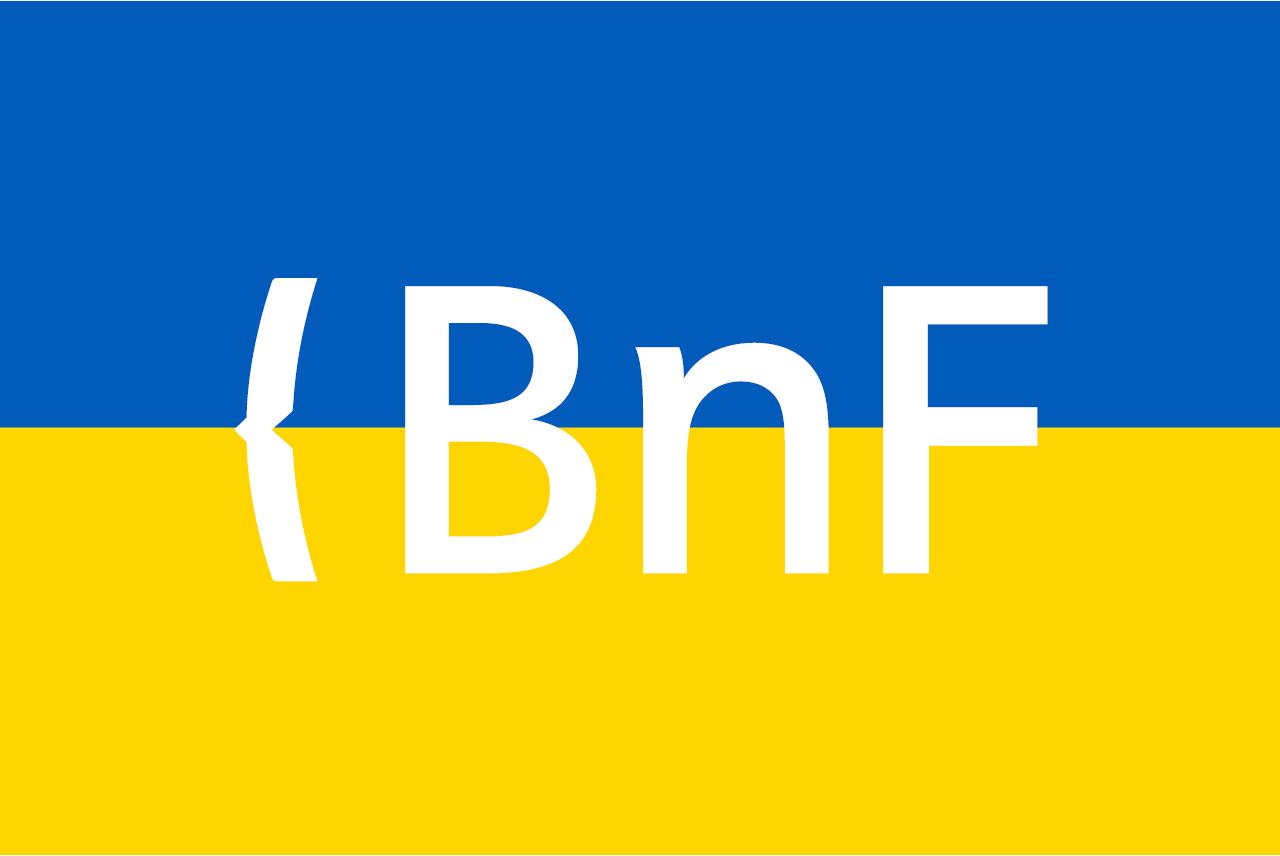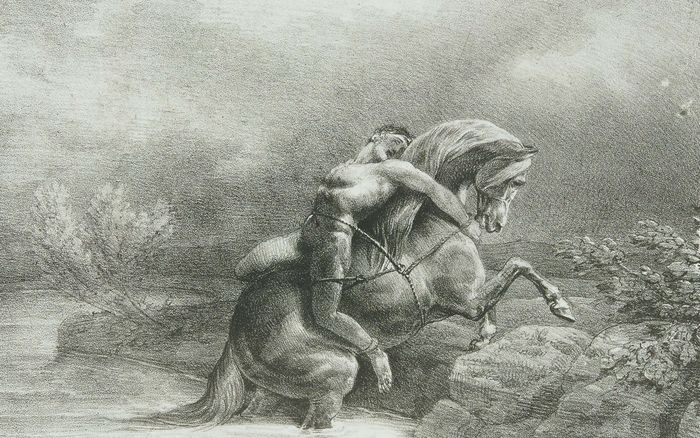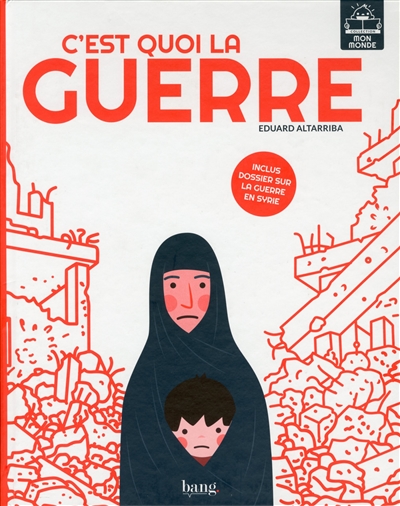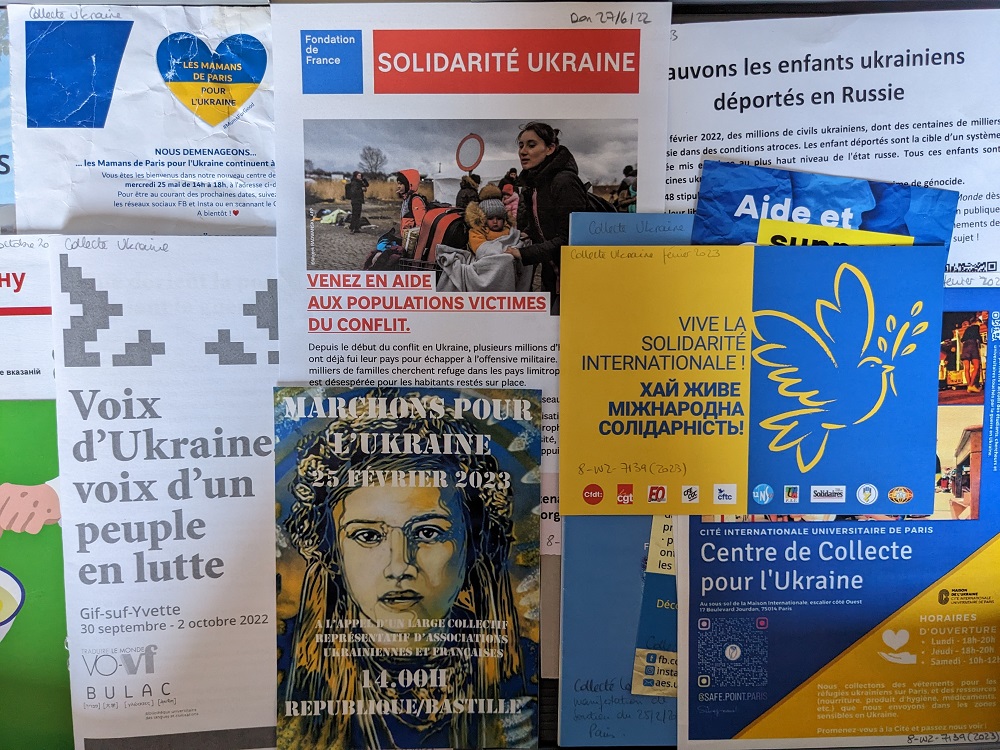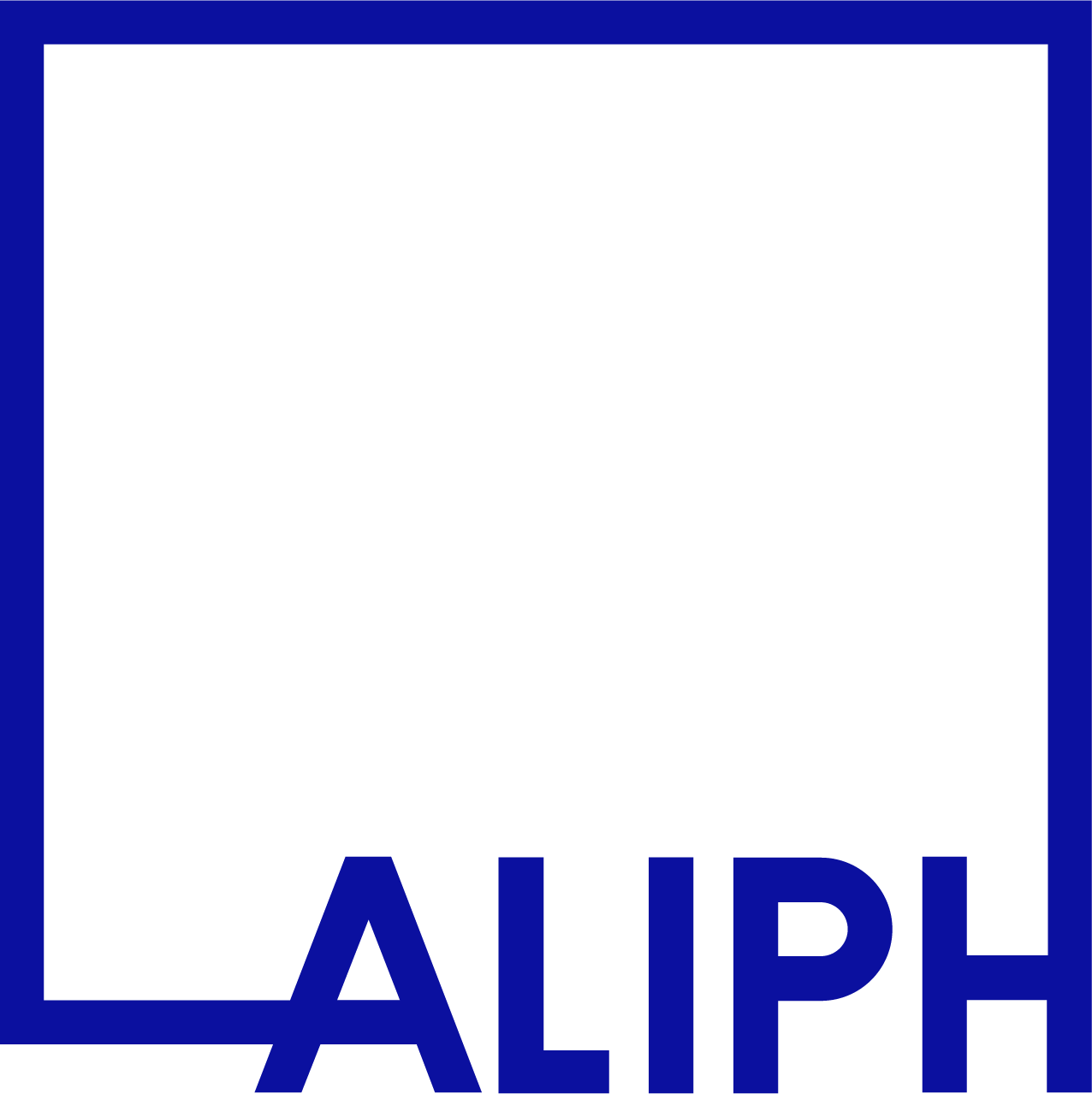Please note: exceptional closure of the Francois-Mitterrand site on Monday 10 March 2025
Solidarity with the Ukrainian People
The BnF stands with Ukraine and is helping Ukrainian cultural institutions and their staff through cooperation and heritage preservation initiatives.
Discover here the dedicated cultural programme, as well as the selection of resources available, online and in the reading rooms, related to Ukraine and the current conflict, and more broadly on the theme of war with a selection of works for young people.
Support and cooperation initiatives
Hosting Professionals
- Mr Serhi DOTSENKO, Information Technology Director at the Yaroslav Mudryi National Library, studied the Gallica project in order to draw inspiration from the BnF’s experiences and practices for the creation and development of the Ukrainian digital library.
- Ms Kateryna LYSKOVA, Deputy Director of the V. N. Karazin Kharkiv National University, worked on a project design (creation) of a digital library of French books and manuscripts held by the V. N. Karazin Kharkiv National University.
Training
In June 2025, the BnF shared its expertise within the framework of a training course dedicated to the digital transition of the Constitutional Court of Ukraine’s library. This library, mainly used by professionals, contains contemporary monographs and legal publications that have not yet been digitised, in the same way as its catalogue.
Thanks to the support of TAIEX (Technical Assistance and Information Exchange), a development instrument for the EU institutions, around forty employees benefited from the advice of the BnF experts on subjects such as digitisation processes and specificities, international standards for digital cataloguing along with the preservation and the safety of digital collections.
Targeted web archiving
Within the framework of the legal deposit of the web, the BnF is engaged in collecting possibly transient content (websites, blogs, press articles, relays on social networks) both in France and abroad.
In France, various crawling campaigns have been set up and are currently carried out. Among these, one may mention:
- A harvest carried out prior to the beginning of the conflict to document the events that preceded it, including a selection that led to 450 web files (websites, hashtags and Twitter accounts, blogs, press articles, etc.);
- A “harvest of short-lived news” on what was relayed on social media (Twitter, Facebook, etc.), blogs, press articles or sites with a potentially limited life span.
At the international level, the BnF works alongside its peers and private actors as a founding member of the International Internet Preservation Consortium (IIPC). This consortium aims to promote web archiving through several working groups and through the organization of events. Within this consortium, the BnF is co-piloting with the National Library of the Netherlands a collaborative archive provisionally entitled “War in Ukraine”. Intended to bring together all selections of the various member institutions and organizations, it focuses primarily on national selections, including content that may have been collected as part of the French collection.
More information on web archiving
Resources
In electronic resources
The BnF subscribes to electronic resources that are available free of charge to its users in its reading rooms. Some of these resources can also be accessed remotely by holders of a Research or Reading/Culture Pass.
- PressReader The latest issues of a large number of newspapers worldwide and in several languages (The Guardian, El Pais, Japan news, Libération, etc.).
- Arrêt sur Image Critical analysis of the presentation of the same information by different media, offering different types of content (articles, columns, press kits, media decoding programmes, etc.).
- Medici.TV Concert and dance performance site, providing access to a list of concerts held in Ukraine or in support of Ukraine.
- Gale One File NewsOffers articles from the American and world press (magazines, academic journals, books, images and videos).
- Cairn Almost 8,000 resources (journals, books and pocket encyclopaedias) on Ukraine.
- Encyclopaedia Universalis Almost 500 documents (articles, photos, videos and maps) on Ukraine.
- Factiva Academic International press database providing access to the full text of over 4,000 titles.
learn more about electronic resources
See also the selection of resources from the Press and Media portal
In Gallica
A series of posts is dedicated to Ukraine on the Gallica blog:
In the online exhibitions
« Photographier la guerre » (Photographing War) on the site Presse à la une
The Crimean War (1853-1856) gave rise to the first photographic war reportage and the first international coverage of an event.
Portrait of Mazeppa in the Essentials of Literature
The story of Ivan Mazeppa, a Ukrainian nobleman who firstly was a page in the court of a Polish king in the 17th century, became a legend relayed by Voltaire and revisited by the Romantics, including Lord Byron (1819) and Victor Hugo.
How to talk to children about war?
With war once again knocking on Europe’s door, the French National Centre for Children’s and Young People’s Literature has compiled a list of books to help parents and children talk about present and past conflicts.
War and its aftermath in children’s books
This selection enables a first comprehensive approach to the issue. Evoking conflicts of the 20th and 21st centuries, albums, novels, documentaries, comics and poetry deal with the issue of refugees, the daily life of children, but also the hope, life, solidarity and transmission that ultimately lead to peace.
Lire dans l’urgence, l’urgence de lire (Reading in situations of urgency, the urgency of reading)
Books to overcome fear, to protect oneself from the fury of the world, and to maintain hope for a better future.
Writing and depicting war
This issue of “La Revue des livres pour enfants” (The Children’s Book Review) (no. 276 – April 2014) looks at the forms that representations of war – imaginary or on real historic conflicts – can take in fiction, albums, comics and novels. Can we really relate and depict everything, whatever the age of the readers we are addressing, even if the editorial forms have been well adapted?
Find out more on the CNLJ website
Free to access in our reading rooms
French as a Foreign Language and Ukrainian-French learning methods
In order to provide assistance to Ukraine, Skilleos, an online course company and supplier of the BnF for French as a Foreign Language (FLE), is offering access to two learning methods, free of charge and open to all. You can learn the Ukrainian language if you are a French speaker or learn French if you are Ukrainian. To do so, you just need to create an account and follow the different lessons offered through 13 chapters that will allow you to communicate more easily in everyday life.
Bibliography
Grigorìj Savič Skovoroda
FR - PDF - 577.54 Ko
Ukrainian Philosopher, Poet, Musician, and Translator (1722–1794)
Selective Bibliography
March 2023
Collecting documentation
Following the example of the mobilisation of staff which made the May 1968 leaflets collection possible, the Collections team is collecting all ephemeral printed documents such as brochures, leaflets, posters, flyers, etc. relating to the war in Ukraine.
Communiques from voluntary organisations, documents to assist welcoming, flyers from support events, activist leaflets, ministerial recommendations, etc. – any type of document can be included in the collection, regardless of who produced it (public authorities, voluntary or activist organisations, individuals, etc.). This collection will allow the BnF to preserve important and fragile testimonies of the conflict, a material for today’s and tomorrow’s researchers.
To participate, please send us these documents at the following address:
Bibliothèque nationale de France
Service Histoire (équipe Recueils)
Quai François Mauriac
75706 PARIS CEDEX 13, France
Thanks to the contributors, nearly 450 documents have been collected in one year.
- They can be consulted on the François Mitterrand site, in the research library, in reading rooms L and M.
- You can also find the complete references of the collection in the general catalogue.
Cultural events
Hélène Châtelain, in the footsteps of Nestor Makhno in Ukraine
16 November 2024 – 5 p.m.- 6.30 p.m. – François-Mitterrand
In the early 1990s, film-maker Hélène Châtelain (1935-2020) travelled to Ukraine, her mother’s homeland, to gather first-hand stories about Nestor Makhno (1888-1934), a leading figure in the 1917 Revolution, a peasant who founded the Ukrainian revolutionary insurrectionary army, who was then exiled and who died in poverty in Paris. Upon her return, she made Nestor Makhno, paysan d’Ukraine (13 Production, 1996, 60 min) in which she recounts this epic story, debunking the black legend constructed by the Soviets, based on the texts of the revolutionary and the mark he left on his country.
Screening followed by a discussion with Jean-Jacques Hocquard, the film’s producer from Parole Errante, Jean-Louis Porte, who shot the film in Ukraine, and Iryna Dmytrychyn, lecturer in Ukrainian studies at Inalco.
Screening organised in partnership with the Ukrainian Institute in France and the Institut national des langues et civilisations orientales (Inalco).
Ukraine: video game studios at war
28 November 2024 – 6 p.m.- 8 p.m – François-Mitterrand
The video games industry in Ukraine has experienced spectacular growth since the 2000s. The Ukrainian developer community is renowned for the quality of its work, whether collaborating with major international studios or designing its own projects. Local production has gained recognition that extends beyond the country’s borders, such as the emblematic game Stalker developed by GSC Game World or games from studios Frogwares (Sherlock Holmes, The Sinking City) and VG Entertainment (Fear the Wolves), renowned for their quality. How have these studios and their teams been affected by the intrusion of war into their daily lives, first in 2014 (with the annexation of Crimea and the war in the Donbass) and then in February 2022 with Russia’s massive aggression?
This round-table discussion, moderated by Françoise Daucé (EHESS), brought together Wael Amr, founder of the Frogwares studio, and Oleg Yavorsky, of VG Entertainment, to talk about the effects of the war on their work and their new projects.
In French and in English
Ukraine: Affirmation and Recognition of a Nation
From 22 May to 14 December 2023
What do we know of the history of Ukraine, from its birth to the recognition of its independence? How can its culture, its literary, artistic and intellectual figures be presented? How can we understand the aspirations of the Ukrainian people today? This series of meetings invites specialists to shed light on the present in the context of Ukraine’s past, from the affirmation of its existence by the people to the international recognition of the Ukrainian nation and its sovereignty.
- BORDERS OF UKRAINE, 22 MAY 2023, 6-8PM, INALCO
- THE “Executed RENAISSANCE” IN UKRAINE (1920S-1930S): FIGURES OF A SACRIFICED INTELLIGENTSIA, 16 JUNE 2023, 2-6PM, BnF (site François-Mitterrand)
- “SLOVO HOUSE”, BY TARAS TOMENKO, 16 JUNE 2023, 18H-20H, BnF (site François-Mitterrand)
- HOLODOMOR: HISTORY AND MEMORY OF THE GREAT FAMINE OF 1932-1933 IN UKRAINE, 30 NOVEMBER 2023, 6.30-8PM, BnF (site François-Mitterrand)
- “MARUSYA”, A NOVEL BY MARCO VOVCHOK: ITINERARIES OF A PHENOMENON IN UKRAINIAN LITERATURE AND ITS AUTHOR, 5 DECEMBER 2023, 6.30-8PM, BnF (site Richelieu)
- Maïdan: emancipations and mobilisations in Ukrainian society (2013-2023), 14 DECEMBER 2023, 7-8PM, INALCO
Scientific coordination: Iryna Dmytrychyn, lecturer, head of Ukrainian studies at Inalco .
This series of conferences is organised by the Institut national des langues et civilisations orientales (Inalco), the BnF and the Bibliothèque universitaire des langues et civilisations (Bulac) with the support of the Ministry of Culture.
The “Executed Renaissance” in Ukraine (1920s-1930s): Figures of a Sacrificed Intelligentsia
16 June 2023 – 2 p.m.- 6 p.m. – François-Mitterrand
As part of a series of meetings devoted to the Ukrainian nation, initiated by the BnF, BULAC and Inalco, a half-day study session looks back at the great figures of Ukrainian literature in the 1920s, who were repressed by the Bolsheviks.
In the aftermath of the 1917 Revolution, a new generation of writers and poets in Ukraine, driven by the hope of national emancipation, launched a ‘Renaissance’ of Ukrainian literature. The 1920s saw an unprecedented increase in the number of works published in Ukraine, as well as the emergence of several literary groups, the most famous of which was Vaplitè, the Free Academy of Proletarian Literature. The Bolshevik repression that followed in the 1930s saw these writers disappear from the Ukrainian cultural scene, either because of their assassination, or as a result of their literary death due to (self-)censorship or exile.
Holodomor: History and Memory of the Great Famine of 1932-1933 in Ukraine
30 November 2023 – 6.30 p.m. - 8 p.m. – François-Mitterrand
This conference looks back at one of the least-known major events in twentieth-century European history: the great famine of 1932-1933 in Ukraine. Completely ignored for over half a century in the USSR, this episode has been referred to as the Holodomor since Ukraine gained its independence in 1991. While historians and legal experts are still debating whether it should be qualified as genocide, Nicolas Werth - a historian specialising in the history of the Soviet Union, director of research at the Institut d’histoire du temps présent (CNRS) and president of the Mémorial-France association - will take a closer look at this famine, which was not preceded by any meteorological cataclysm.
“Marusya”, a novel by Marco Vovchok: Itineraries of a Phenomenon in Ukrainian Literature and its Author
4 December 2023 – 6.30 p.m. - 8 p.m. – Richelieu
This conference looks at the short story Marusya by Russian-Ukrainian writer Marco Vovchok, published in 1871. Condemning the Russian occupation of Ukraine, this story, which has become a classic of children’s literature, is also the tale of literary appropriation.
How did this story about a 17th-century Ukrainian girl become emblematic in France during the Third Republic? What can we learn from the adoption of this work in France, which has outstripped its success in its country of origin? These are the questions that will be addressed by Iryna Dmytrychyn, lecturer and head of Ukrainian studies at Inalco .
Maïdan: emancipation and mobilisation of the Ukrainian society (2013-2023)
14 December 2023 – 7 p.m. - 9 p.m. – Inalco
From November 2013 onwards, snow barricades hardened by frost rose up on Kyiv’s central square. For ten weeks, millions of Ukrainians demonstrated against the arbitrary rule of power, in the capital and other cities across the country. Simultaneously a demonstration of political rights, a space for new socialisation and a baptism by fire, the Maïdan sheds light on changes in Ukrainian society.
A discussion in words and images with :
- Ioulia Shukan, lecturer in Slavic studies at the University of Paris Nanterre, researcher at the Institut des sciences sociales du politique. Author of Génération Maïdan: aux origines de la résistance ukrainienne (2022, ed. de l’Aube)
- and Guillaume Herbaut, photojournalist. Author of Ukraine: terre désirée (2022, Textuel)
Moderator: Sophie Lambroschini, researcher specialising in Eastern Europe at the Marc Bloch Research Centre in Berlin. Author of Ukrainiens (2022, ed. Henry Dougier)
The International Shockwave of the War in Ukraine
2 February 2023 – 4 p.m.- 6 p.m. – François-Mitterrand
In some respects, the Russian war in Ukraine has significantly altered the international balance of power in Eurasia, in Europe and in the transatlantic area. On a global scale, it has also shown divergences in the assessment of the crisis and in the reaction and adaptation to its effects.
One year after the beginning of the conflict, what are the future prospects for Ukraine, for Russia and for the European Union in a considerably reshaped regional context? What will be the medium and long-term international political, economic and strategic consequences of the conflict?
Live on Facebook: « La BnF dans mon salon » (“The BnF in your living room”)
8 April 2022 – 6 p.m.
On the BnF’s Facebook page, Isabelle le Masne de Chermont, director of the Department of Manuscripts, talks about Princess Anne of Kyiv, who became Queen of France through her marriage to King Henry I, grandson of Hugues Capet.
See the conference (in French)
Concert in support of Ukraine: Fedir Yakymenko
15 April 2022 – 6.30 p.m. – François-Mitterrand
The BnF has put on a solidarity concert in support of Ukraine, performed by the musicians of the Radio France Philharmonic Orchestra. All proceeds from this event went towards sending material to our Ukrainian colleagues for the conservation and safeguarding of heritage.
The concert showcased the work of the Ukrainian composer Fedir Yakymenko (1876 1945) who spent part of his life in France, and whose manuscripts are kept at the BnF. This exceptional concert is an addition to the programme of the European music season held under the French Presidency of the Council of the European Union, with the support of the Ministry of Culture.
Watch the concert
Special Round Table – Analysis and Consequences of the War in Ukraine
20 April 2022 – 6 p.m.- 8 p.m. – François-Mitterrand
On 24 February 2022, Russia launched an invasion of Ukraine, expecting a quick victory. Two months after the beginning of a prolonged conflict that has invalidated many of the assumptions that underpinned the Kremlin’s dramatic decision, researchers at the Foundation for Strategic Research offer insights into this war and its regional and international strategic implications.
Support for the programme of the Ukrainian Cultural Forum in Rouen
Like many cultural institutions, the BnF is joining the initiative of the Réunion des Musées métropolitains Rouen Normandie (Meeting of the Metropolitan Museums of Rouen Normandy – RMM) and the Institut national d’histoire de l’art (National Institute of Art History – INHA), to open a cultural forum to bring to life the threatened Ukrainian culture and heritage.
Conference “Ukraine in the collections of the Bibliothèque nationale de France”
29 June 2022 – 2.30 p.m – Rouen, Musée des Beaux-arts
To conclude the season, the Ukrainian Cultural Forum is inviting Isabelle le Masne de Chermont, director of the Manuscript Department, and Mathias Auclair, director of the Music Department, to speak about “Ukraine in the collections of the Bibliothèque nationale de France” through two major figures from different periods: Anne of Kyiv and Fedir Yakymenko. Anne, daughter of the prince of Kyiv, Yaroslav the Wise, became queen of France through her marriage, in 1051, to Henry I. The BnF holds the only known official document bearing her signature, which attests to the part she played in the exercise of royal power. Fedir Yakymenko, born in Kharkov in 1876, is one of the most important Ukrainian composers. A teacher of Igor Stravinsky in St. Petersburg, Yakymenko fled the Soviet regime, settling first in Prague, where he was active in the central Ukrainian emigration organisation, then in Nice and finally in Paris. A large part of his autograph manuscripts joined the collections of the BnF following his death in 1945.
In French
The BnF has received financial support from ALIPH, tthe International alliance for the protection of heritage in conflict areas, to implement these activities.


